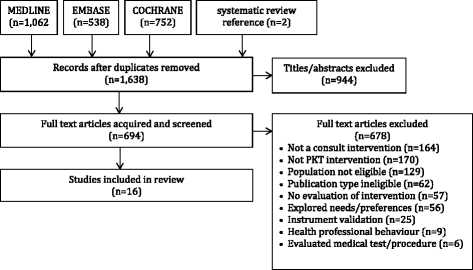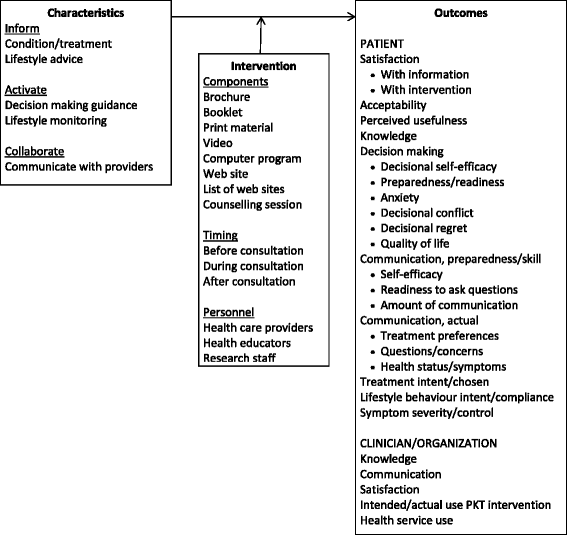Patient-mediated knowledge translation (PKT) interventions for clinical encounters: a systematic review
- PMID: 26923462
- PMCID: PMC4770686
- DOI: 10.1186/s13012-016-0389-3
Patient-mediated knowledge translation (PKT) interventions for clinical encounters: a systematic review
Abstract
Background: Patient-mediated knowledge translation (PKT) interventions engage patients in their own health care. Insight on which PKT interventions are effective is lacking. We sought to describe the type and impact of PKT interventions.
Methods: We performed a systematic review of PKT interventions, defined as strategies that inform, educate and engage patients in their own health care. We searched MEDLINE, EMBASE and the Cochrane Library from 2005 to 2014 for English language studies that evaluated PKT interventions delivered immediately before, during or upon conclusion of clinical encounters to individual patients with arthritis or cancer. Data were extracted on study characteristics, PKT intervention (theory, content, delivery, duration, personnel, timing) and outcomes. Interventions were characterized by type of patient engagement (inform, activate, collaborate). We performed content analysis and reported summary statistics.
Results: Of 694 retrieved studies, 16 were deemed eligible (5 arthritis, 11 cancer; 12 RCTs, 4 cohort studies; 7 low, 3 uncertain, 6 high risk of bias). PKT interventions included print material in 10 studies (brochures, booklets, variety of print material, list of websites), electronic material in 10 studies (video, computer program, website) and counselling in 2 studies. They were offered before, during and after consultation in 4, 1 and 4 studies, respectively; as single or multifaceted interventions in 10 and 6 studies, respectively; and by clinicians, health educators, researchers or volunteers in 4, 3, 5 and 1 study, respectively. Most interventions informed or activated patients. All studies achieved positive impact in one or more measures of patient knowledge, decision-making, communication and behaviour. This was true regardless of condition, PKT intervention, timing, personnel, type of engagement or delivery (single or multifaceted). No studies assessed patient harms, or interventions for providers to support PKT intervention delivery. Two studies evaluated the impact on providers of PKT interventions aimed at patients.
Conclusions: Single interventions involving print material achieved beneficial outcomes as did more complex interventions. Few studies were eligible, and no studies evaluated patient harms, or provider outcomes. Further research is warranted to evaluate these PKT interventions in more patients, or patients with different conditions; different types of PKT interventions for patients and for providers; and potential harms associated with interventions.
Figures
References
-
- Légaré F, Zhang P. Chapter 3.4h Shared decision making. In: Straus SE, Jacqueline T, Graham ID, editors. Knowledge translation in health care: moving from evidence to practice. 2. Chichester: John Wiley & Sons, Ltd; 2013.
Publication types
MeSH terms
Grants and funding
LinkOut - more resources
Full Text Sources
Other Literature Sources
Medical



